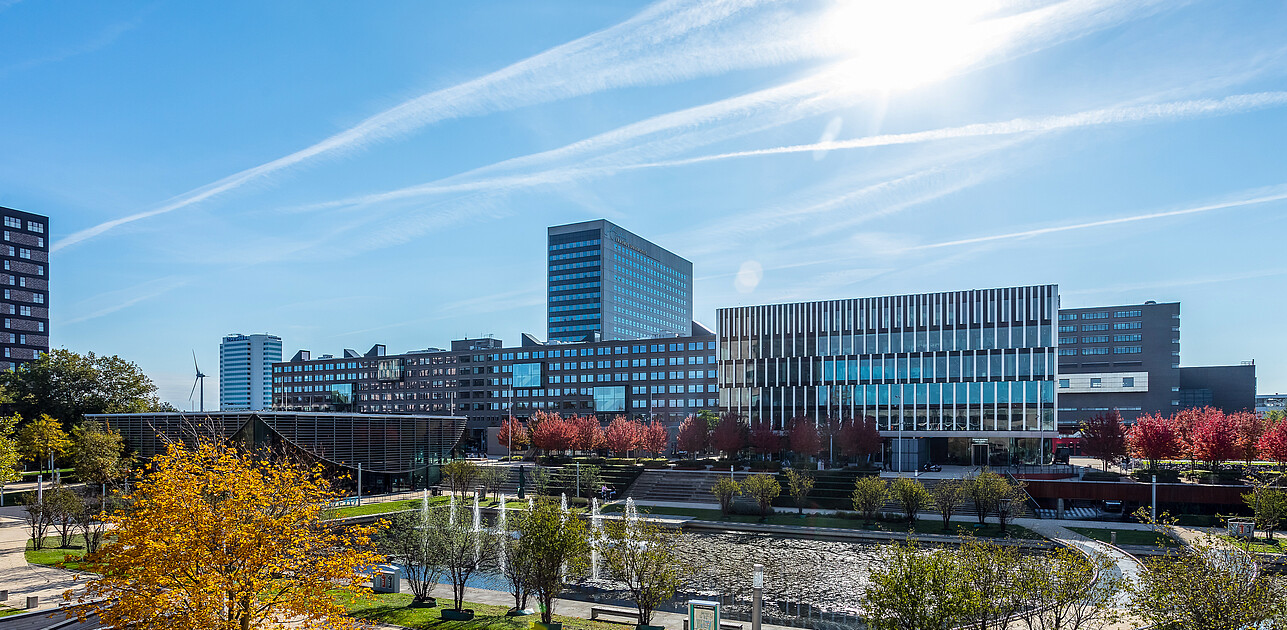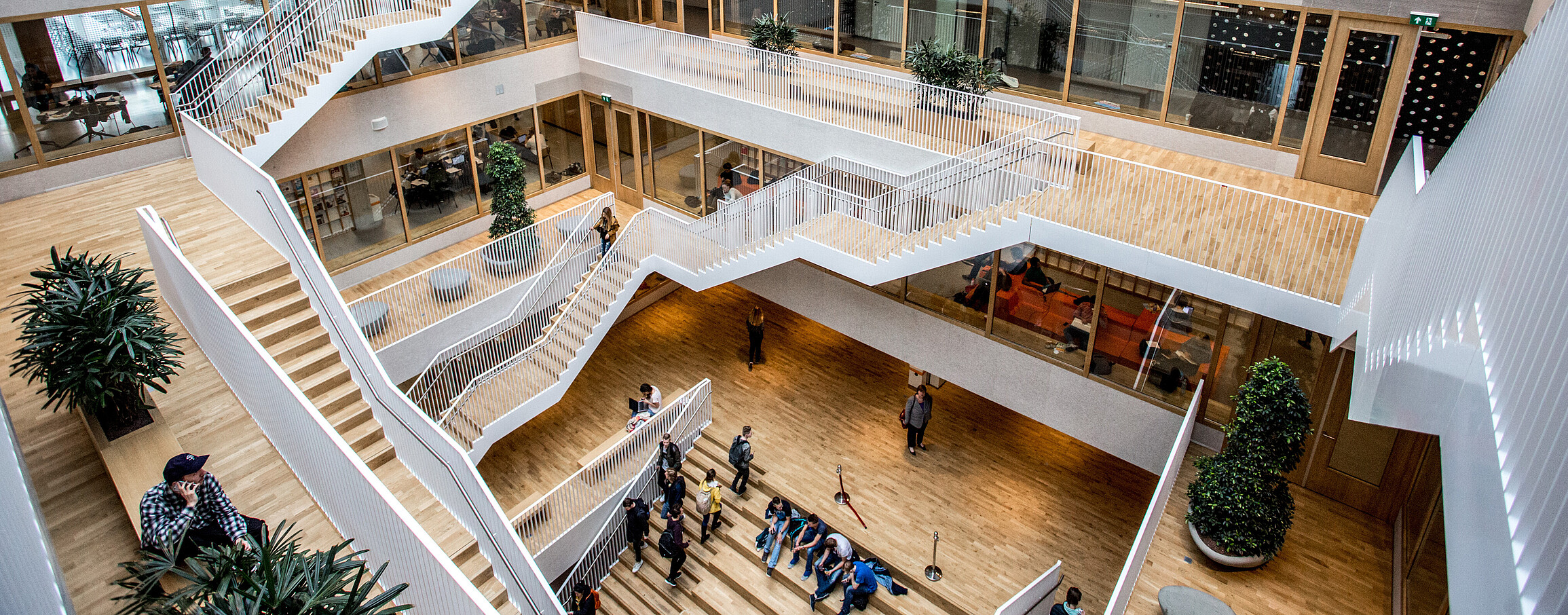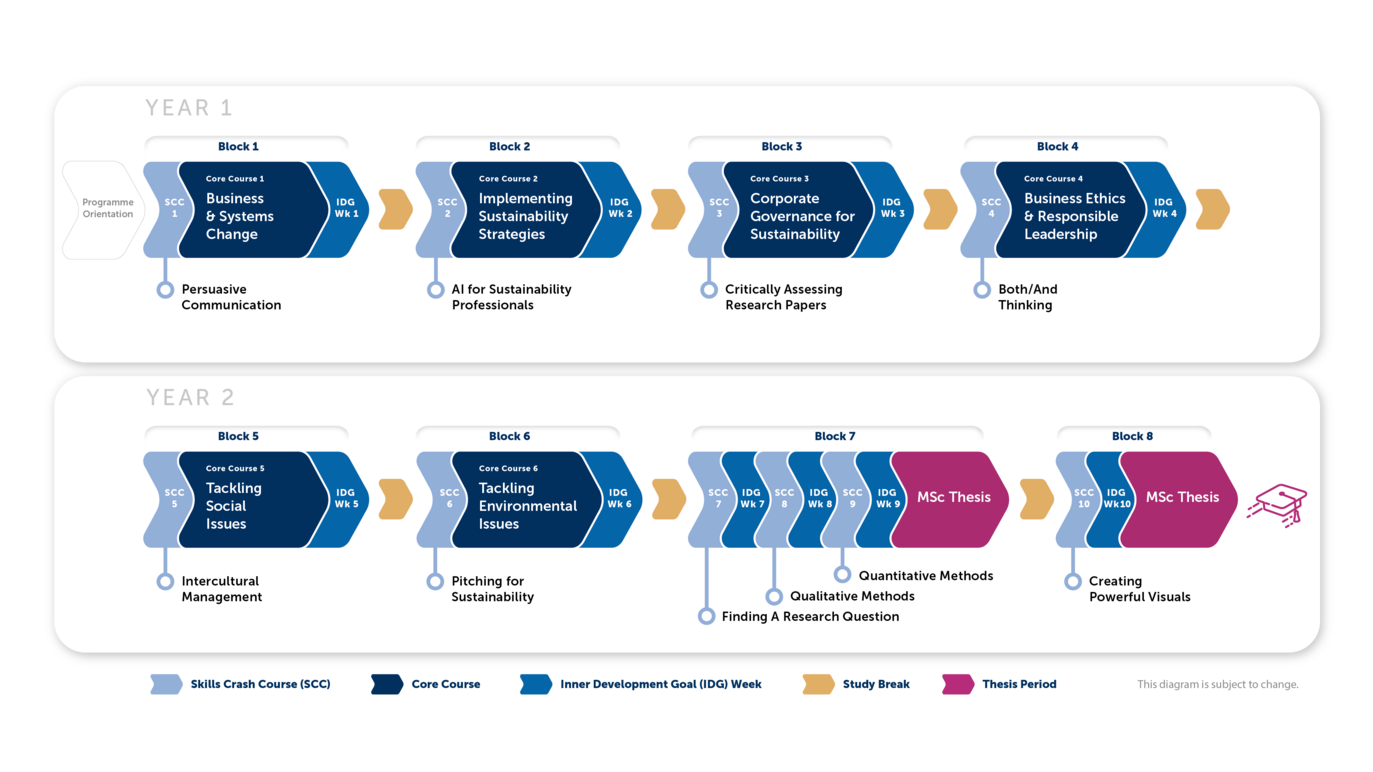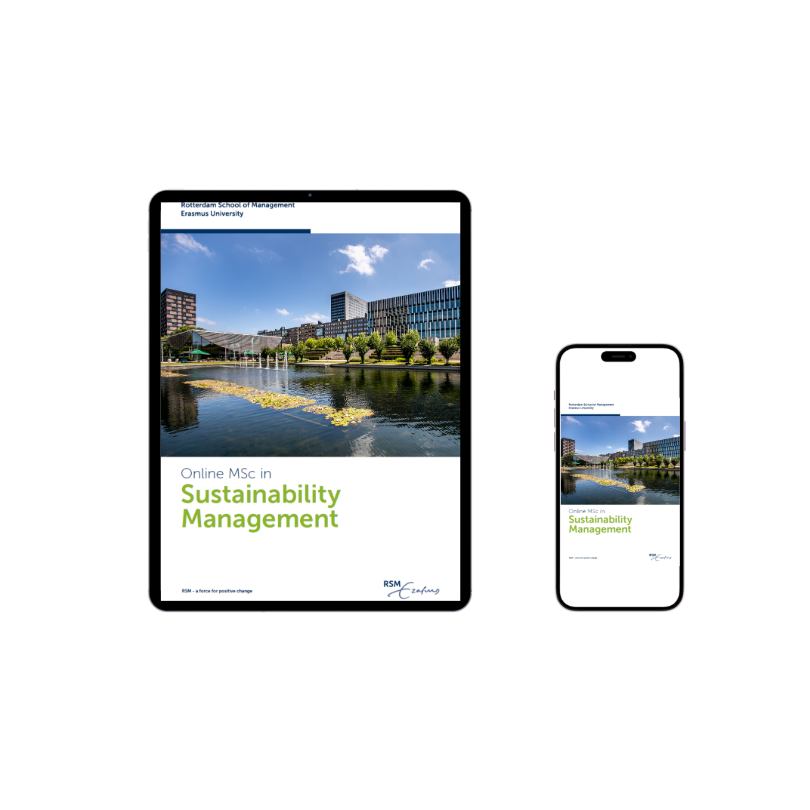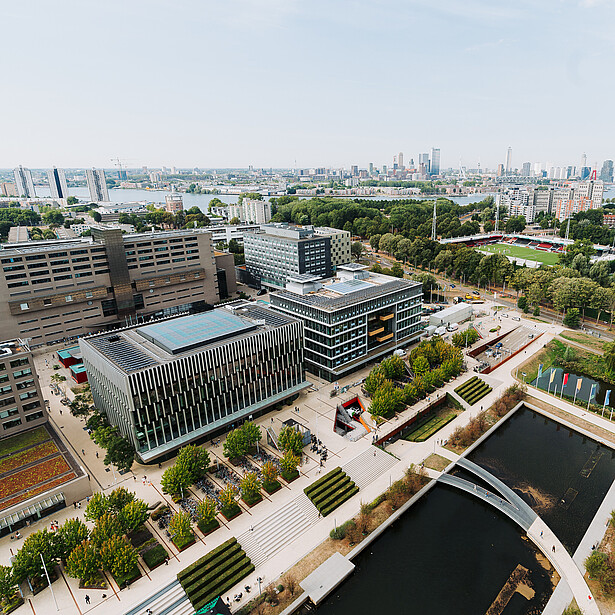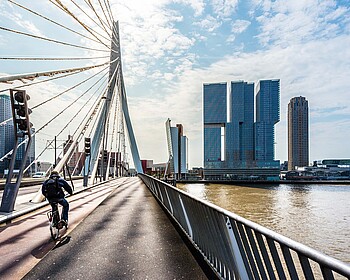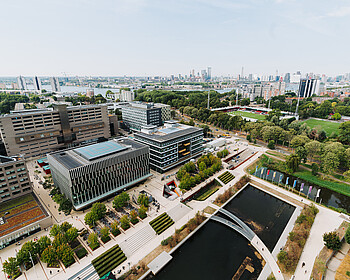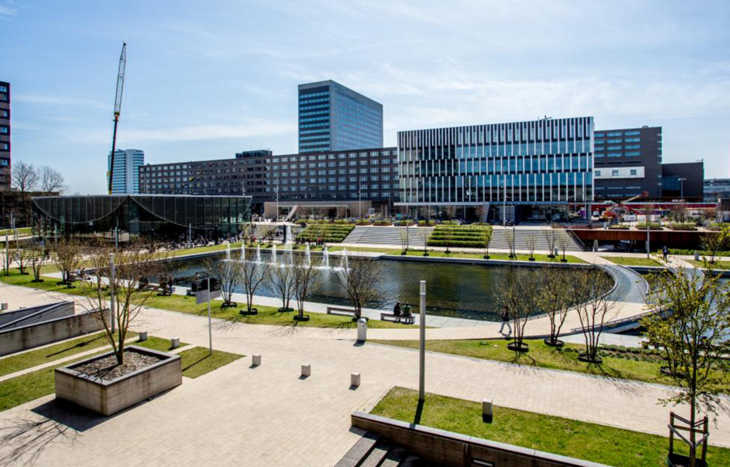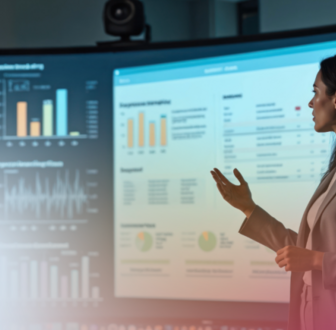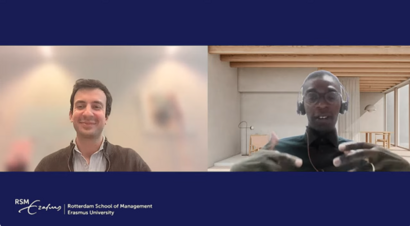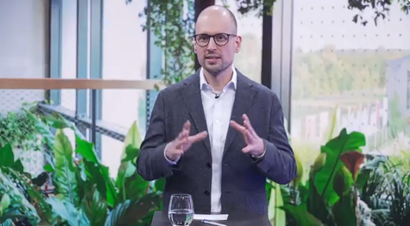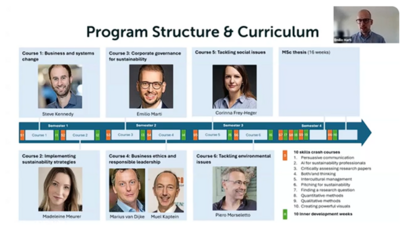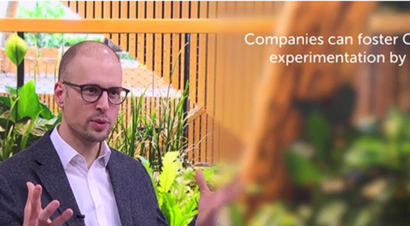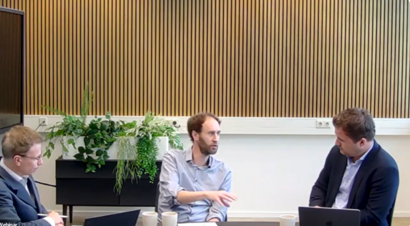The online MSc Sustainability Management is a two-year programme consisting of six courses. You will study theoretical foundations of sustainability management, which will then be applied to solve real-world problems and obstacles.
At the end of your study, you will have to complete your final project, where you will apply the knowledge you gained during the programme to overcome a real challenge than an organisation is facing.
Year 1
Your programme starts by building a platform for your learning journey and laying the foundations for impactful management.
Coursework includes:
- Learning the principles of sustainability.
- Exploring different worldviews of sustainable development and how those views may generate differentiated approaches and actions.
- Analysing the current approaches of companies.
- Evaluating how firms can use a systems perspective and innovation process to build business solutions that enhance the health of social-ecological systems.
Curious to learn more about this course? Watch the introduction by Dr Steve Kennedy below:
In the second course, you step into the role of a sustainability manager.
This course focuses on:
- Sustainability strategies that help to drive environmental and social impact within companies.
- The key frameworks of sustainability management.
- Practical tools and case studies that empower you to integrate sustainable practices into business operations.
Curious to learn more about this course? Watch the introduction by Dr Madeleine Meurer below:
In your third course, you explore the question: Why are some companies more sustainable than others?
Coursework includes:
- Analysing governance mechanisms that shape corporate sustainability.
- Exploring the impact of internal governance mechanisms, such as top management teams, boards of directors, and shareholders.
- Evaluating external governance mechanisms, such as ESG rating agencies, the media, social activists, and regulators.
Curious to learn more about this course? Watch the introduction by Dr Emilio Marti below:
In the fourth course, you examine responsibility and ethics as pillars of sustainability.
You are stimulated to:
- Develop the capabilities you need to help you avoid moral blind spots.
- Internalise and embrace ethical behaviour in your daily work practices.
- Lead other stakeholders within and beyond organisational boundaries to work towards sustainability objectives.
Year 2
The fifth course investigates the complexity of tackling social issues.
You learn how to:
- Critically appraise potential solutions to social issues from various perspectives.
- Explore why issues such as labour conditions, inequality or global migration are so difficult to tackle.
- Reflect on the insights from the previous courses to examine the complexity, scale and scope of these issues, and why current solutions often fail.
In the sixth course, you explore how business activities drive major environmental issues, including:
- Climate change
- Biodiversity loss
- Freshwater scarcity
- Habitat destruction
- Pollution
- Overexploitation
For these issues, you further analyse the causes and impact, examine case studies to understand corporate responsibilities, risks, and strategies, and identify practical ways to address the challenges.
Your final project in the online MSc takes place in the last semester, around 16 weeks after you start, in which you are required to analyse a partner company’s sustainability approach and to draw on insights from all the six courses.
For this project, you collect data, critically analyse the company’s actions and write a detailed report. Additionally, you must demonstrate how you collaborated with a company contact and an RSM supervisor.
You will develop essential skills throughout the curriculum, not only through course materials but also via Skills Crash Courses, Inner Development Goals (IDGs), and other enriching learning opportunities.
Analytical skills
During the master you will be quipped with analytical skills, which will equip you to:
- Analyse business sustainability from various perspectives.
- Determine how business is implicated in regard to sustainability issues.
- Evaluate the opportunities and risks that sustainability issues create for businesses and organisations.
- Consider the almost limitless ways in which organisations can become more sustainable.
- Use data to develop solutions.
- Critically assess whether sustainability initiatives produce the intended effects.
Skills Crash Courses: Practical Expertise for Real-World Impact
The skills you gain through these courses are designed to be highly transferable and impactful across diverse professional settings. Each course focuses on building competencies that empower sustainability professionals and leaders to thrive in complex, global environments.
What you will learn:
- Persuasive communication (verbal, non-verbal, and written communication skills).
- AI for sustainability professionals
- Critically assessing research papers
- Both / And thinking
- Intercultural management
- Pitching for sustainability
- Finding a research question
- Quantitative methods
- Creating powerful visuals
Inner Development Goals (IDGs)
Throughout the programme you will also work on IDGs, which are a framework of 23 skills and qualities that help people grow as individuals while also becoming more effective change-makers in sustainability and beyond.
Spread across the eight blocks of the master, the ten-week Inner Development Goals Weeks (IDGWs) course invites learners to explore eight of these goals in depth. Each week focuses on one specific IDG, combining reflection, practice, and dialogue. The aim is to support your personal development journey while equipping you with the inner capacities needed to meet complex global challenges.
We use a blended personalised learning approach that comprises both live learning sessions and independent study. This blend empowers you to engage with the content and your peers in a manner that suits your individual circumstances, while still fostering a sense of community within your own cohort.
The programme follows a structured and logical sequence of modules that enhance overall focus and group cohesion, and it develops and maintains a strong cohort dynamic.
As a student, you can participate effectively regardless of your geographical location or time constraints, because of the flexibility provided with the diverse learning materials and formats.
Cohort size
You and your cohort work together, ask questions, share you knowledge and learn closely with our top faculty and from each other. This collaboration results in:
- Ample interaction in the online classroom.
- Close support from faculty members.
- Detailed feedback during your studies
Independent study
Get more flexibility than a traditional in‑person programme. Examples: online materials such as recorded lectures, discussion forums, case studies, written assignments and essays, and online workbooks
Live sessions
Participate in real time and easily connect with peers and faculty. The live sessions include lectures, panel discussions, Q&A's and masterclasses.
Assessment
Assessment of individual and group learning is done through various formats: essays, online discussions, reports, quizzes, presentations, and peer assessments. These different types of assessments provide everyone with the opportunity to successfully demonstrate their competencies ways that fit their preferences.
Final project
Bring everything together with your final project at the end of your study, where you apply the knowledge gained throughout the programme to address a real sustainability challenge an organisation is facing.
Your final project takes place in the last semester and requires you to analyse a company’s sustainability approach while drawing on insights from all six courses. You may choose to work with one of our partner companies or use a challenge from your own organisation, allowing you to tackle an issue you are currently working on, facing, or aiming to solve in your professional context.
For this project, you collect data, critically analyse the company’s actions, and produce a detailed report. You also demonstrate how you collaborated with a company contact and an RSM supervisor throughout the process.
The world in your classroom
The Sustainability Management programme is built on diversity. Diversity of thought, of experience, of culture, of background, of perspective. Our students come from all over the world. From a myriad of industry backgrounds. From a vast diversity of roles and functions. Each person brings his or her unique perspective, outlook and experience to a rich and challenging interchange that will upturn your preconceptions and broaden your thinking.
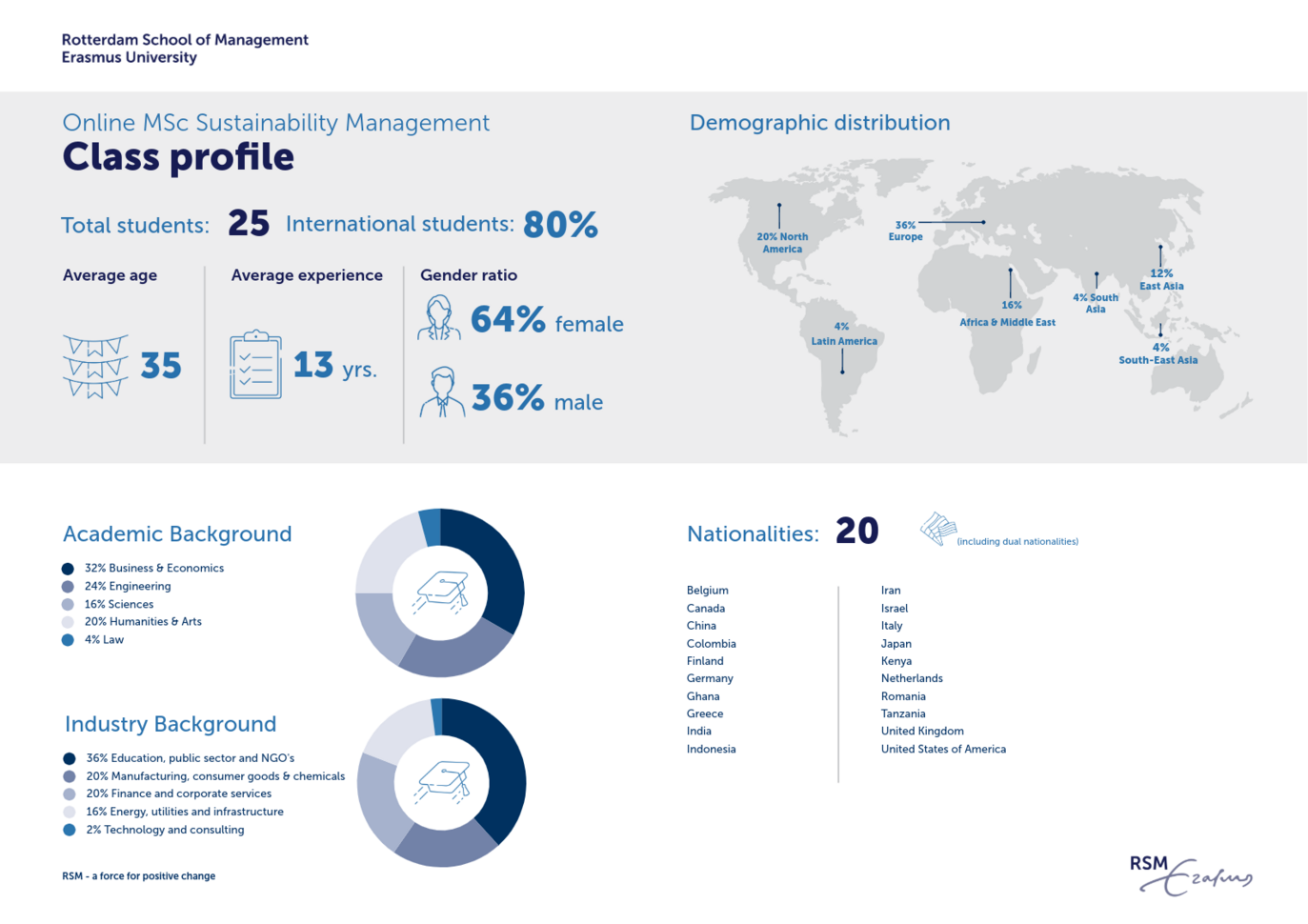
RSM’s online master programme modules are taught by experienced faculty members who are both experts in their fields and active researchers in the field of sustainability management. Get to know some of them here.
Piero Morseletto
Academic Co-Director
Course: Tackling environmental issues
Skills Crash Courses: Finding a research question, Creating powerful visuals

Emilio Marti
Academic Co-Director
Course: Corporate governance for sustainability
Skills Crash Course: AI for sustainability professionals, Qualitative methods

Corinna Frey-Hager
Associate Professor
Course: Tackling social issues

Steve Kennedy
Associate Professor
Course: Business and systems change
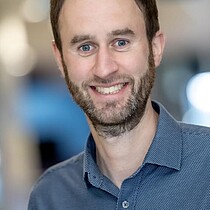
Madeleine Meurer
Assistant Professor
Course: Implementing sustainability strategies

Marius van Dijke
Professor in Behavioural Ethics
Course: Business ethics and responsible leadership
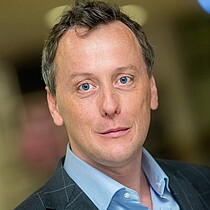
Muel Kaptein
Professor of Business Ethics and Integrity Management
Course: Business ethics and responsible leadership

Khadija van der Straaten
Associate Professor
Skills Crash Course: Intercultural management, Quantitative methods

Luke Fiske
Assistant Professor
Skills Crash Course: Persuasive communication

Tony Choi
Assistant Professor
Skills Crash Course; Critically assessing research papers

Ferran Torres
Assistant Professor
Skills Crash Course: ‘Both/and’ thinking

Taslim Alade
Senior Lecturer
Skills Crash Course: Pitching for sustainability

Sustainability has become a booming career field with positions across companies and industries.
What career development advantages do you gain by choosing this MSc?
- More mobility in the Sustainability field.
- Potential promotion to a senior management role.
- Can integrate sustainable practices into core business strategies.
- Updated and deepened knowledge of global sustainability standards and practices.
- Can advise on sustainable development and environmental compliance in a consulting role.
- Enhanced expertise in sustainable management practices.
- Become a thought leader in the field of sustainability.
What are some common job titles in the field of sustainability management?
- Sustainability Manager / Sustainability Specialist
- Corporate Social Responsibility (CSR) Manager
- Sustainability Project Manager
- Climate Change Analyst
- Sustainable Supply Chain Manager
- ESG (Environmental, Social, Governance) Specialist/Analyst
- Sustainability Consultant
- Environmental Policy Analyst
- Sustainability Reporting Analyst
- Urban Sustainability Planner
- Green Building Consultant
- Climate Consultant
